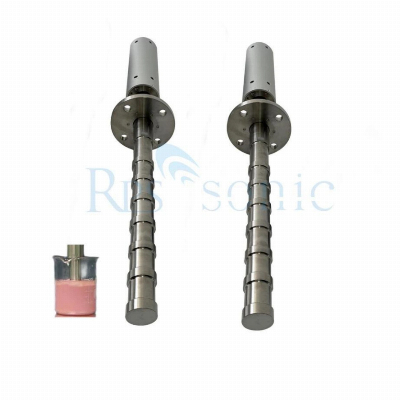Commercial-Scale Ultrasonic Nano-emulsification of
CannabinoidsProduct ParametersBasic Info.Model
NO.RPS-SONO20-3000ConditionNewFrequency20kHzGeneratorDg
GeneratorHornTitanium AlloyCapacity20 L/MinTransport
PackageCartonTrademarkRps-sonicOriginChinaHS
Code8515900090Production
Capacity200PCS/MonthModelSONO20-1000SONO20-2000SONO15-3000SONO20-3000Frequency20±0.5
KHz20±0.5 KHz15±0.5 KHz20±0.5 KHzPower1000 W2000 W3000 W3000
WVoltage220/110V220/110V220/110V220/110VTemperature300 ºC300 ºC300
ºC300 ºCPressure35 MPa35 MPa35 MPa35 MPaIntensity of sound20
W/cm²40 W/cm²60 W/cm²60 W/cm²Max Capacity10 L/Min15 L/Min20 L/Min20
L/MinTip Head MaterialTitanium AlloyTitanium AlloyTitanium
AlloyTitanium AlloyUltrasonic graphene dispersion equipmentGraphene
is the thinnest and hardest two-dimensional material in the world
composed of a single layer of carbon atoms. Its very good strength,
flexibility, electrical conductivity, and thermal conductivity have
important functions in various fields. In the natural state, there
is no single-layered inkene material-it generally exists as
three-dimensional graphite. It is very important to extract
single-layered graphene from graphite.Ultrasonic graphene
dispersion is also called ultrasonic graphene peeling. The graphite
oxide reduction method is used in conjunction with ultrasonic
vibration to effectively increase the distance between graphite
oxide layers. Graphite oxide with a large layer distance is not
only beneficial for other molecules and atoms to insert between
layers to form graphite oxide. Intercalation composite materials
can be easily peeled into single-layer graphite oxide, laying a
foundation for the further preparation of single-layer
graphene. Ultrasonic dispersion principleThe ultrasonic
nano-dispersion system / ultrasonic graphene dispersion equipment
uses the cavitation of ultrasonic waves to disperse agglomerated
particles. It is theThe granular suspension (liquid) is placed in a
super-strong sound field and processed with appropriate ultrasonic
amplitude. In cavitation effect, high temperature, high pressure,
microjet, strong vibration, etc.Under the additional effect, the
distance between the molecules will continue to increase,
eventually causing the molecules to break up and form a single
molecular structure. This product is especially useful for
dispersing nanomaterials(Such as carbon nanotubes, graphene,
silica, etc.) have good results.There are a large number of
graphite materials in nature, and 1 millimeter thick graphite
contains approximately 3 million layers of graphene. Single layer
of graphite is called graphene, in a free stateThis substance does
not exist below, and all exist in the form of graphite sheets
laminated with multilayer graphene. Because the interlayer force of
the graphite sheet is weak, it can be carried out by external
force.The layers were peeled off to obtain a single-layer graphene
with a thickness of only one carbon atom.The ultrasonic graphene
dispersion system uses the ultrasonic-assisted Hummers method to
prepare graphene oxide. It uses a liquid as a medium and adds
high-frequency ultrasonic vibration to the liquid. Since ultrasound
is a mechanical wave, it is not absorbed by the molecules, and the
vibrational motion of the molecules is arched during the
propagation process. Under the effect of cavitation, that is, high
temperature, high pressure, microjet, strong vibration and other
additional effects, the distance between molecules increases its
average distance due to vibration, and eventually causes the
molecules to break. The distance between graphite oxide layers can
be increased more effectively, and with the increase of the
ultrasonic power, the interval between the obtained graphite oxide
layers is increasing. The pressure released by the instantaneous
ultrasonic wave destroys the van der Waals force between the
graphene layer and the layer, making it more difficult for graphene
to cluster together. Graphite oxide with a large interlayer
distance is not only conducive to the insertion of other molecules,
atoms and other interlayers to form a graphite oxide intercalation
composite material, but also is easily peeled into a single layer
of graphite oxideLay the foundation for the further preparation of
single-layer graphene.Ultrasonic dispersing equipment can be used
for the dispersion and homogenization of graphene, ink coatings,
etc .; petroleum emulsification; traditional Chinese medicine
extraction processing; cell, ballast water crushing, disinfection;
accelerated reaction of chemical raw materials. Detailed
Photos /* March 10, 2023 17:59:20 */!function(){function
s(e,r){var
a,o={};try{e&&e.split(",").forEach(function(e,t){e&&(a=e.match(/(.*?):(.*)$/))&&1
Related products about Commercial-Scale Ultrasonic Nano-Emulsification of Cannabinoids
-
 Waste Tyre Plastic Recycling Machinery Machine Tire Crusher Production Line Rubber Crumb Grinding Machine Equipment Tire Shredder
Waste Tyre Plastic Recycling Machinery Machine Tire Crusher Production Line Rubber Crumb Grinding Machine Equipment Tire Shredder
-
 Stretch Plastic Blowing Pet Bottle Making Blow Molding Machine Bottles Stretch Automatic Pet Bottle Blowing Machine
Stretch Plastic Blowing Pet Bottle Making Blow Molding Machine Bottles Stretch Automatic Pet Bottle Blowing Machine
-
 Waste Plastic Pet Bottle, Water Bottle Flake, PP/HDPE/LDPE PE Film Jumbo Woven Bags Plastic Crusher Machine, Plastic Crushing Washing Recycling Machine
Waste Plastic Pet Bottle, Water Bottle Flake, PP/HDPE/LDPE PE Film Jumbo Woven Bags Plastic Crusher Machine, Plastic Crushing Washing Recycling Machine
-
 Type 2 Wall-Mounted Electric Car Charging Station 7kw /11 Kwelectric Vehicle Charging Station Home Wallbox AC EV Charger Single Phase or 3three Phase
Type 2 Wall-Mounted Electric Car Charging Station 7kw /11 Kwelectric Vehicle Charging Station Home Wallbox AC EV Charger Single Phase or 3three Phase
-
 G-View G12W Wholesale Auto Car LED Headlight Bulb High Power H13 H11 9005 H7 H4 Car LED Headlights LED Car Lights
G-View G12W Wholesale Auto Car LED Headlight Bulb High Power H13 H11 9005 H7 H4 Car LED Headlights LED Car Lights
-
 New Design Porcelain Round Plates Dinner Set for Wedding and Banquet
New Design Porcelain Round Plates Dinner Set for Wedding and Banquet
-
 China 2023 New Design Super Soft 100% Polyester Microfiber Knitted Oversized Decoration Hoodie Blanket
China 2023 New Design Super Soft 100% Polyester Microfiber Knitted Oversized Decoration Hoodie Blanket
-
 Handmade Art Creative Materials Thickened White Paper Cup DIY Disposable Handmade Colored Paper Cup
Handmade Art Creative Materials Thickened White Paper Cup DIY Disposable Handmade Colored Paper Cup



